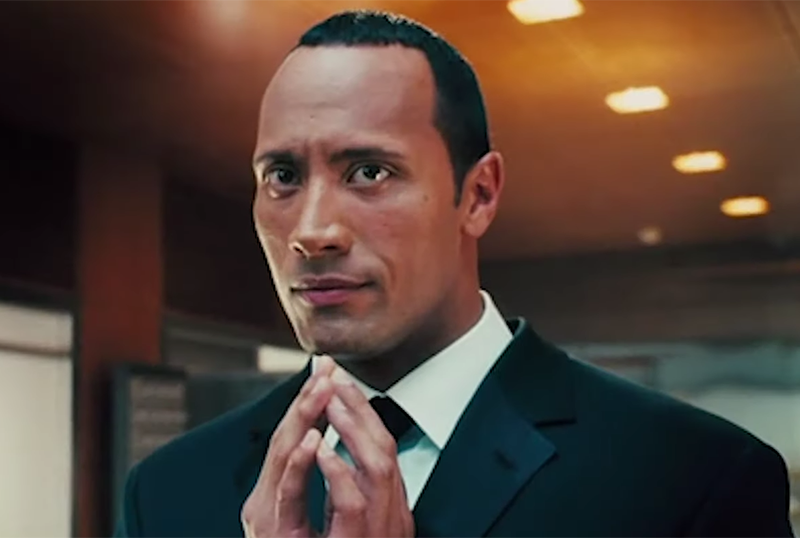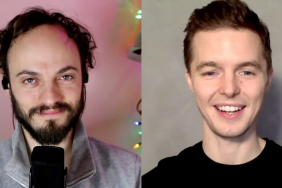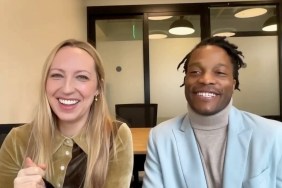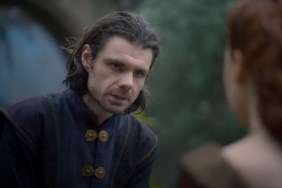As the film nears its 15th anniversary of debuting at the 2006 Cannes Film Festival and in time for the new Blu-ray release featuring that infamous cut, ComingSoon.net got the opportunity to chat with Southland Tales writer/director Richard Kelly to discuss the latter and revisiting the polarizing cult classic sci-fi crime thriller.
RELATED: Exclusive: Richard Kelly Talks Donnie Darko Sequel & Rod Serling Biopic
ComingSoon.net: So Southland Tales, I mean, 15 years later, it still proves to be, for me, one of the most ambitious, creative, baffling, so many different and great emotions from it. What’s it like for you coming up on that anniversary all this time later?
Richard Kelly: Well, it’s all of those emotions, but I am grateful and I’m hopeful for the opportunity to kind of revisit Southland Tales and if there is a chance for us to do something much bigger with it, I’m very grateful for that because our intention in making it was always for it to be this therapeutic work of cinema for people to experience as a response to sort of the doomsday of the world that we’re living in. The doomsday of 2006 is now much different today. It’s much bigger and it’s much more all-encompassing in a lot of ways. But you know, we all live with the threat of the apocalypse every single day. And so, this film was always intended to be, again, a therapeutic remedy for people that want it or might desire to experience it. So I’m very grateful that people are still excited to engage with this film after all these years.
CS: So given that you wanted the cathartic nature of it, how did the story come to your mind? It’s such an interesting combination of the political elements and the sci-fi elements and so many different things. I mean, how did the actual elements sort of come to your mind?
RK: Well, the story actually started out as a kind of a Los Angeles crime caper. And you’ll see that architecture still very much at the epicenter of the story of the film with – so the original early draft of Southland Tales, it was a troop of frustrated actors in this beach, like a comedy troupe to decide they’re going to blackmail a movie star who’s doing a ride along research trip for his action film that he’s making. And so, it was like this troop of comedy actors teaming up with a porn star, and one of them is a cop and has a twin brother and they’re going to extort money from this actor. And it ended with a blimp exploding over Downtown Los Angeles, for some reason, you know? And so that was like the original architecture of the film. And then, I think as time wore on and then I got more kind of potential opportunities presented to actually make the film, I started layering in what I call like the Philip K. Dick layer to the story in terms of all of the politics and the religion and the science fiction and all of the layers sort of surrounding this crime story at the center of the movie.
Click here to purchase your copy of the special new Blu-ray edition!
CS: Obviously the Cannes cut, it was a little polarizing in its reception, and then in the years since you’ve talked about interest in possibly coming back for a proper home media release with it. I mean, what was it like for you going back to it and sort of making sure it was just right to give to audiences now on Blu-ray?
RK: Well, I want to be very clear to people that the Cannes version that you see on this Blu-ray is a work in progress version of the film. It’s kind of like going into a time machine back to 2006 and seeing pretty much exactly what we showed to the audience at Cannes and what we brought to Cannes was an unfinished work in progress. It had a lot of unfinished visual effects in it, it’s sort of like a time capsule. But when you watch the Cannes version and also watch the theatrical version, you can see how much more there is that we can hopefully do with Southland Tales and the potential for a real proper expanded version of it with today’s technology and today’s distribution ecosystems, the more we can hopefully do with it. I want to be clear to people that the Cannes version, we haven’t done any new visual effects work to the Cannes version. It’s presented as a restoration of what was shown in 2006.
CS: So what about the Cannes version do you think – I mean, obviously you say there was more in it, but what specifically about the additional stuff in the Cannes footage would you say resonates with you from the storytelling more so than the theatrical?
RK: Well, I think the Cannes version tells deeper into the individual characters. You get to spend more time with the individual characters, with the actors and their performances. There’s also more of a gigantic subplot that we never really got to fully explore that involves Janeane Garofalo’s character, Army General Teena MacArthur, her character, who is monitoring some sort of mysterious game experiment that is connected to the gigantic machine out in the ocean, the alternative fuel generator machine out in the ocean called Utopia 3. There’s some hints of some “Dungeons & Dragons” gameplay going on between her character and Simon Theory, the other Army General character played by Kevin Smith in the film. So there’s a lot more big science fiction stuff that we only got to scratch the surface with and you can see more of it in the Cannes version of the film. So, I’m grateful that people can at least see some of those scenes included in the film and how they kind of expand the world of Southland Tales in a way that is much, much bigger than has even been captured so far.

CS: So since you mention some of the various roster of cast that you had in the film, with Donnie Darko, you already proved that you could draw in a good ensemble and balance them all out. But with Southland, I felt like the ensemble was just even further elevated. What was that like building up that roster of talent for your such unique characters across the board?
RK: It was beautiful. It was so great to get to work with all of these amazing actors. I love all of these actors. I’ve always loved their work growing up. Kind of the shared DNA of every actor in this film is they have great comedic improv skills. They can all think on their feet and they can do comedy and they all kind of have this sort of foothold in pop culture in different ways in that they are from Saturday Night Live or pro wrestling or a sitcom or an ’80s action film or a cult film or all have this sort of foothold in pop culture in a way that I felt was – they were each like this wonderful new piece of candy to sort of put into this collage, this sort of big doomsday apocalyptic story, to have all these wonderful kind of candy colored personalities and these funny people popping up throughout the film.
CS: Who would you say was the most vital bit of casting for you since – I mean, obviously, you know, Dwayne Johnson and Seann William Scott and the main group are all important for the film, but who would you say was the most vital for you in getting to be a part of the film?
RK: Well, listen, I say everyone is vital across the board. Obviously Dwayne and Sean and Sarah were like the three anchors in terms of their characters anchoring the whole story. But I will say getting Justin Timberlake was really a gift because he became the narrator of the film, I decided as we were shooting his scenes, I immediately decided that he had to be the narrator because of the music video dream sequence at the center of the film, which is kind of the heartbeat of the whole film, where he’s lip syncing to The Killers and he breaks the fourth wall and he’s looking straight into the lens. That dictated to me that he must be the narrator because the narrator is also breaking the fourth wall. So, we did two versions of Justin’s voiceover, for the Cannes version of the movie, I had Justin do it in a very playful kind of a mischievous tone and I think after we were so scolded at Cannes and we were kind of traumatized after it, we had to recut the movie down and try to beg and plead for visual effects money and cut the movie down and stuff. I brought Justin back in and I had him re-record the voiceover like Martin Sheen in Apocalypse Now in a much more somber kind of monotone and Justin did an amazing job in both voiceovers, but I will say after all these years have passed, I prefer his voiceover in the Cannes version and the sort of playful nature of it because just given everything that’s happened in the world, I think that’s more of a fitting kind of tone in hindsight. I think that’s part of the way that I look at things, from the Cannes version that I prefer.
RELATED: CS Interview: John Rhys-Davies Talks Grizzly II: Revenge
Written and directed by Kelly, the film is set during a three-day heat wave just before a huge 4th of July celebration in a then-near future twisted version of Los Angeles, an action star stricken with amnesia meets up with a porn star who is developing her own reality TV project and a policeman who holds the key to a vast conspiracy.
Much like Kelly’s debut effort, Donnie Darko, the film features an ensemble cast that includes Dwayne Johnson (Hobbs & Shaw), Seann William Scott (Lethal Weapon), Sarah Michelle Gellar (Buffy the Vampire Slayer), Mandy Moore (Midway), Justin Timberlake (Trolls World Tour), Miranda Richardson (Good Omens), Wallace Shawn (Toy Story 4), Bai Ling (Crank: High Voltage), Nora Dunn (The Boss Baby: Back in Business), John Laroquette (The Good Fight), Kevin Smith (Jay and Silent Bob Reboot), Amy Poehler (Parks and Recreation), Wood Harris (Creed II) and Janeane Garofolo (Wet Hot American Summer).
After receiving a polarized reception at the 2006 Cannes Film Festival, Sony Pictures acquired the domestic and most of the international rights to the film from original distributor Universal Pictures and hit select theaters in November 2007, where it continued to receive a mixed reception from critics and audiences alike and flopped financially, only grossing an estimated $374K on its $17 million budget. Despite this, the film would later garner a cult following.










